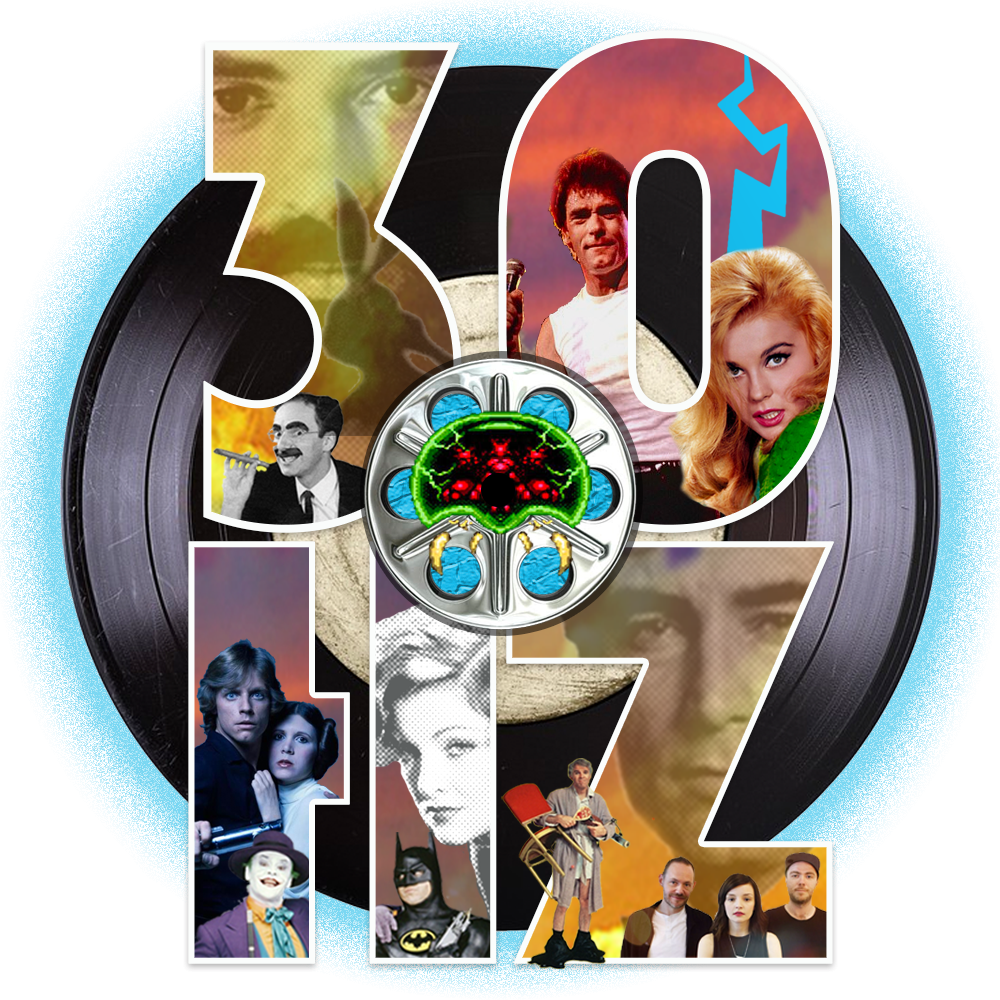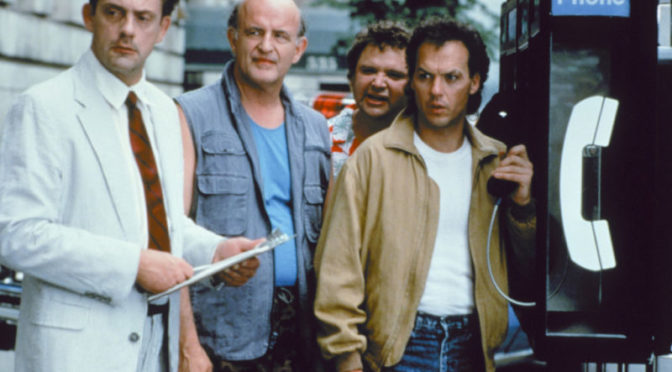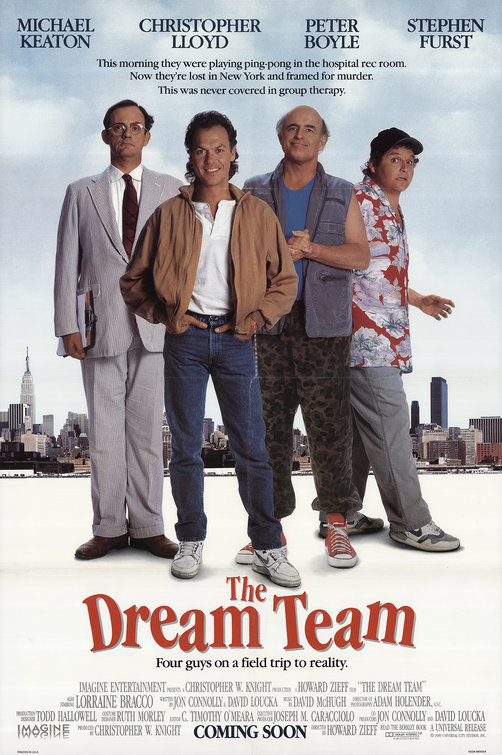Billy: We’re a special combat unit looking for some Libyan terrorists. In fact, I think we have them cornered at a bagel shop across the street. Now if we could just get some pants for the colonel.
Army Surplus Store Owner: Give me a break.
Billy: Alright, we’re four escaped lunatics.
Army Surplus Store Owner: This I believe.
The Dream Team (1989)
Few movies and actors stand out as representatives of the 1989 movie scene more directly than The Dream Team and Michael Keaton. Keaton, of course, would don the Batman cowl later this very same year.
Released April 7th, 1989, The Dream Team met with modest reviews and a lukewarm box office. It finished second behind Major League for the week and went on to take a total of $28million in 7 weeks in release.
Contemporaneous critics considered it One Flew Over the Cuckoo’s Nest-Lite and even in 1989 cited its flippant attitudes toward mental health and treatment. Even as they wagged their fingers, critics like the curmudgeonly Vincent Canby appreciated “the talents of the principal performers.”
Michael Wilmington of the Lost Angeles Times hit a home run with the following observation:
The union of four oddballs–rebel-writer, obsessive noodge, religious fanatic and couch potato–is almost too schematic, as if the writers were somehow trying to define ’80s dissidence. But even though you can predict virtually everything that happens from the first five minutes on, the director and actors manage to hook you in.
Howard Zieff’s The Dream Team doesn’t do anything that hasn’t already been done and done better, but there’s something about the film that resonates with fans despite the obvious, face-value criticisms.

The Dream Team Story
Dr. Weitzman, a psychiatrist working in a New Jersey sanitarium, takes his four primary patients on a field trip to the Yankees game, but along the way he accidentally stumbles upon two crooked cops as they murder a fellow officer. He’s assaulted and knocked into a coma. Now stranded in New York City on their own, the patients must work together despite their differences and relative inefficiencies to find their doctor and protect him from the cops that want to eliminate the final witness to their nefarious doings.
The Dream Team Cast
Michael Keaton, Peter Boyle, Christopher Lloyd and Stephen Furst turn an average script about “runaway” mental patients with a predictable narrative into something warm and comfortable.
The appeal is not just watching these eminent characters each given the green light to chew scenery under the guise of mental instability (although one can’t help but enjoy that aspect of the production). The real appeal of The Dream Team might just be the way these actors make us feel just by being on screen together.

Part of this belongs in the realm of extratextual nostalgia for each of their careers. Keaton, Boyle, Lloyd and Furst have been given characters that tap into themes and elements from past performances. That “nostalgia factor” can’t be discounted. They are also merely talented comedic and dramatic actors who understand that the art of playing broad comedy isn’t inherently connected to playing loud and louder.
Even Michael Keaton, whose character Billy Caufield displays violent tendencies, turns it off at a moment’s notice (which makes you think it’s mostly just an act to escape a world that just sucks a little bit too much). He’s introduced, in fact, as he plays ping-pong with a patient named Kenny who can’t move his paddle fast enough to make contact with even the slowest volley. It’s played for a laugh, but Billy displays empathy. There’s even a callback later when he makes sincere mention that he’s going to be disappointed to miss his regular ping-pong date.
“If you ever work up a serve to go with that backhand it’s going to be a dark day in Peking, baby,” he says after Kenny once again fails to return his very easy serve. These are jokes — yes — but they’re not the point-and-laugh kind of gag, and I think that’s an important distinction.
Each of these actors plays caricature, but with a tether to regular human compassion. Christopher Lloyd ends up doing the bulk of the heavy lifting when he’s faced with returning to his family to ask for help. He’s shut himself off because he’s embarrassed and expects they’ll all have moved on without him. The movie slows and among the chaos, a quiet moment of insight and relatively fragile emotion.
Without the abilities of Keaton, Lloyd and Boyle, there’s nothing holding together the erratic tone of the film. I don’t want to sell the small moments as anything approaching the level of dramatic profundities. They’re drama among swirling chaos, but the imbalance somehow contributes to a more complete whole.

The Dream Team’s view on mental illness, though…
Jon Connolly and David Loucka’s script provides a safe playing field for the mass consumption of mental illness. While One Flew Over attempts to humanize patients without scrubbing them clean, The Dream Team presents average humans with a slightly more drastic case of offbeat. Michael Keaton spins compulsive lies and flies off handle. Peter Boyle rebels against corporate America by becoming a nudist born-again Christian. Christopher Lloyd just wants things in their right place. Stephen Furst has insulated himself from the world by quoting baseball commentary. In another movie, they’d just be colorful eccentrics without agency. This narrative, however, forces agency.
The movie has no interest in delving into mental illness on a serious level. I’ve seen casual condemnations of the film suggesting that it undermines the very foundation of the mental health industry. While I understand the frame of reference that would lead someone to make this kind of assertion, I can’t take such a thing seriously when the film offers caricature and innocent humor at the expense of grim reality. The Dream Team plainly recalls One Flew Over the Cuckoo’s Nest, but it has no interest in anything other than escapism, which it does at no one’s specific expense (except maybe some misguided psychiatrists).

The Dream Team in 1989
Let’s return to my introductory thought that The Dream Team is a movie that represents the moviegoing year at large. 1989 remains a year best known for the movie events of the summer — Indiana Jones and the Last Crusade, Ghostbusters II, Lethal Weapon 2, and, of course, Batman. Those movies didn’t define 1989 in my mind, however. The movies that slipped between the first-run cracks defined 1989.
UHF, Tango & Cash, Major League, Bill & Ted’s Excellent Adventure, Weekend at Bernie’s, Say Anything, Troop Beverly Hills — lesser budgeted Hollywood fare that didn’t make waves at the box office but ultimately found a devoted and lasting audience. As the last gasp of the 1980’s, the year offered audiences so much more beyond the tentpole productions. The greatest tragedy is that none of these movies would actually be made in 2019.
The Dream Team Final Thoughts
Though this isn’t as laugh-out-loud funny as I remembered, I’m drawn more to the moments when The Dream Team becomes an somewhat quietly effective drama amidst the face-value silliness — and that it works at all feels somewhat miraculous, if not held together with spit, duct tape and Michael Keaton hyperbole.
Christopher Lloyd, most notably, provides this balance and he’s probably not given enough credit when Boyle and Keaton are blustery forces of nature. And maybe this is nostalgia talking, but I’m not here to dissect Hollywood’s treatment of mental illness. I’m only here because The Dream Team still resonates as a feel-good, low-aspiration comedy and a showcase for three brilliant comedic actors.
The Dream Team is available on Blu-ray and DVD from Universal.

James David Patrick is a writer. He’s written just about everything at some point or another. Add whatever this is to that list. Follow his blog at www.thirtyhertzrumble.com and find him on Twitter, Instagram, and Facebook.


